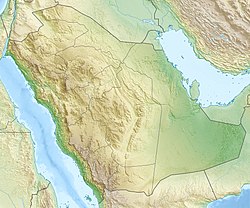Al-Abwa'
Al-Abwa'
ٱلْأَبْوَاء (in Arabic) | |
|---|---|
| Coordinates: 23°06′33″N 39°05′40″E / 23.10926°N 39.09433°E | |
| Country | |
| Region | Makkah |
| Government | |
| • Provincial Governor | Khalid bin Faisal Al Saud |
| Time zone | UTC+3 (AST) |
| Part of a series on |
| Islam |
|---|
 |
Al-Abwā'[1] (Arabic: ٱلْأَبْوَاء) is a Hejazi village between Mecca and Medina belonging to the area of Rabigh, on the western coast of Saudi Arabia. Muhammad entered it before the Battle of Badr, in 2 Safar AH.[clarification needed]
Significance in Islamic history
- The place where Muhammad's mother, Aminah bint Wahb, died.
- It was here that Abu Sufyan ibn al-Harith adopted Islam.[1]
- The Seventh Twelver Shī`a Imām and direct descendant of Muhammad, Musa al-Kadhim, was born in this town.[2][3]
- In 744 CE, after the assassination of the Umayyad Caliph al-Walīd II al-'Abdallah met the Hashimites in the village of al-Abwā', when an oath of allegiance was pledged to his son Muhammad al-Nafs al-Zakiyya as the new Mahdi.[4]
Military campaigns of Muhammad
The fourth caravan raid that Muhammad ordered, known as the invasion of Waddan, was the first offensive in which Muhammad took part personally with 70 troops, mostly Muhajirun.[5]
It is said that twelve months after moving to Medina, Muhammad himself led a caravan raid to Waddan (Al-Abwā). The aim was to intercept the caravans of the Quraysh. The raid party did not meet any Quraysh during the raid.[6][7] However, the caravan of the Banu Damrah was raided. Negotiations began and the two leaders signed a treaty of non-aggression. Banu Damrah pledged not to attack Muslims or side with the Quraysh; and Muhammad pledged not to attack, or seize the goods of, the caravans of the Banu Damrah.[5][6]
See also
References
- ^ a b Abu Sufyan ibn al-Harith, archived from the original on 2009-05-28 on MSA West Compendium of Muslim Texts
- ^ A Brief History of The Fourteen Infallibles. Qum: Ansariyan Publications. 2004. p. 131. ISBN 964-438-127-0.
- ^ "Hazrat Imam Musa Kazim a.s". Archived from the original on 2005-11-04. Retrieved 2006-06-30.
- ^ Abu al-Faraj al-Isfahani, "Kitāb al-Maqātil aṭ-Ṭālibīyīn" (مقاتل الطالبيين), Book of Tālibid Fights
- ^ a b Mubarakpuri, The Sealed Nectar p. 127
- ^ a b Haykal, Husayn (1976), The Life of Muhammad, Islamic Book Trust, p. 217, ISBN 978-983-9154-17-7
- ^ Hawarey, Dr. Mosab (2010). The Journey of Prophecy; Days of Peace and War (in Arabic). Islamic Book Trust. Archived from the original on 2012-03-22. Retrieved 2014-10-04. Book contains a list of battles of Muhammad in Arabic. English version here



